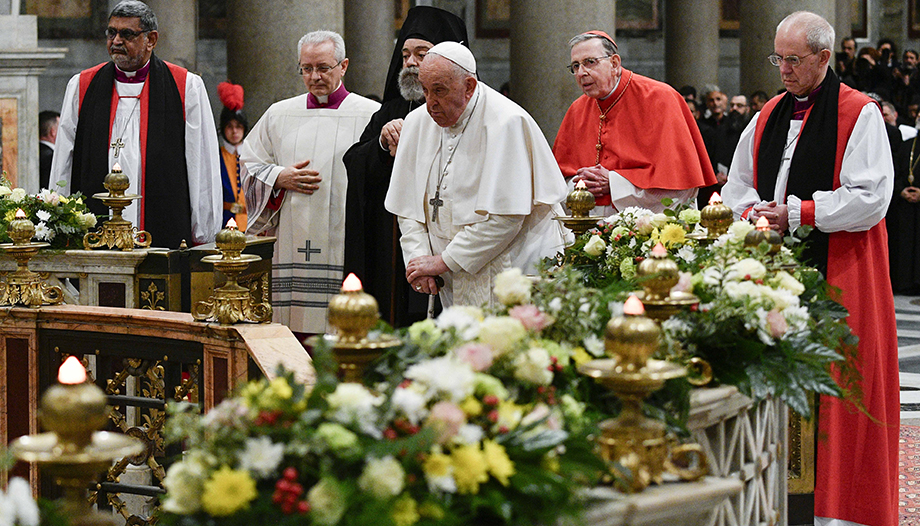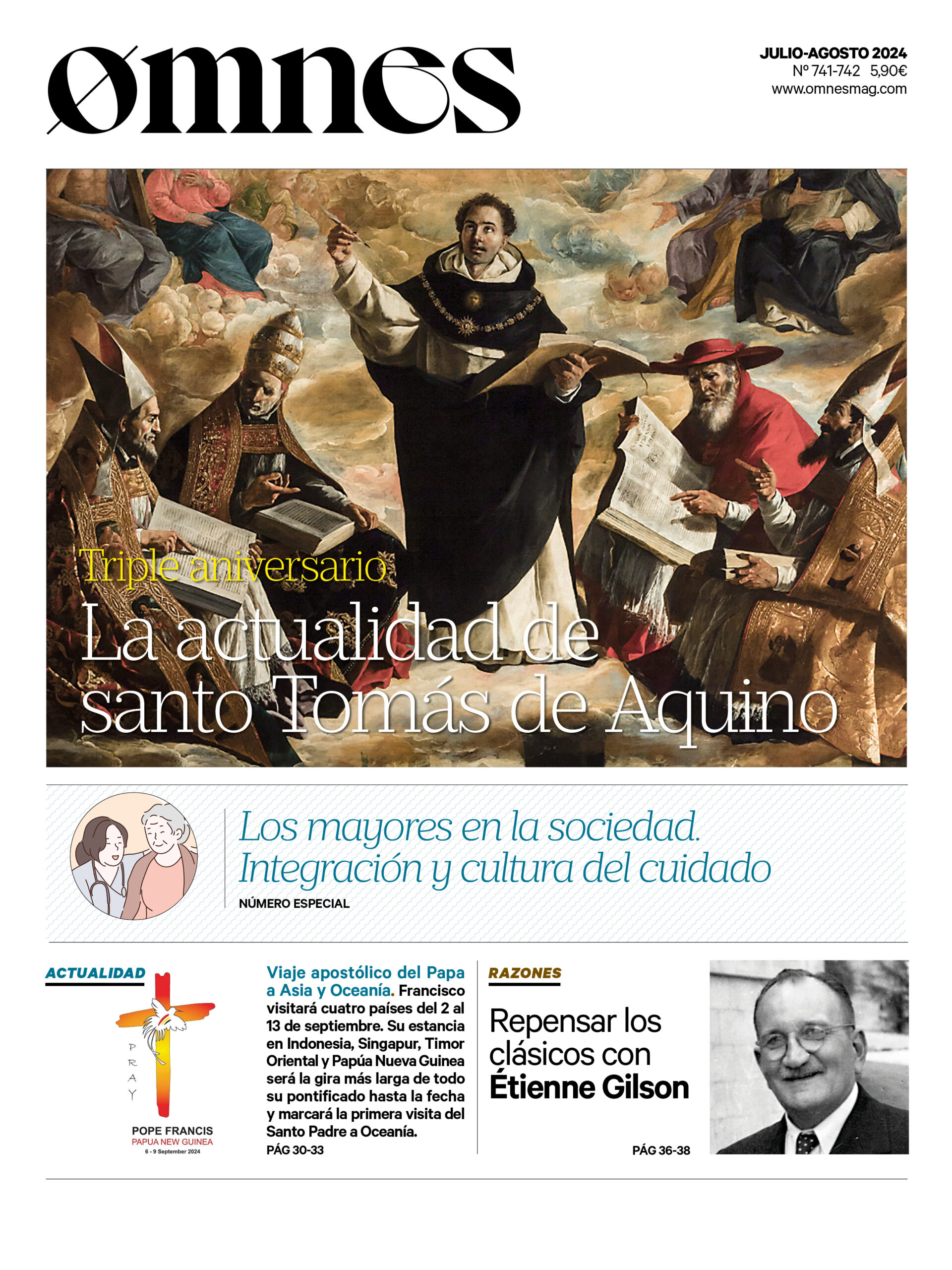Not "who is my neighbor?", but "do I make myself a neighbor?". Reflecting on the parable of the Good Samaritan, Pope Francis delivered his homily during the Second Vespers of the Solemnity of the Conversion of St. Paul, at the conclusion of the 57th Week of Prayer for Christian Unity on the theme "Love the Lord your God...and love your neighbor as yourself."
The Week of Prayer for Christian Unity
It is an ecumenical prayer initiative in which all Christian confessions pray together for the attainment of the full unity that is Christ's will. Traditionally, it takes place from January 18 to 25, because it falls between the Feast of the Chair of St. Peter and the Feast of the Conversion of St. Paul.
It was officially initiated by the Episcopalian Reverend Paul Wattson in Graymoor, New York, in 1908 as the Octave for Church Unity, with the hope that it would become a common practice.
Since 1968, the theme and texts of the prayer have been elaborated jointly by the Faith and Order Commission of the Ecumenical Council of Churches, for Protestants and Orthodox, and the Pontifical Council for Promoting Christian Unity, for Catholics.
For 2024, the theme chosen is taken from the Gospel of Luke: "Love the Lord your God... and love your neighbor as yourself".
"Love the Lord your God...and love your neighbor as yourself."
The texts of the commentaries, prayers and indications on how to live this moment were prepared by an Ecumenical Group from Burkina Faso, coordinated by the local Chemin Neuf Community. Living this experience together, its members reported, was a true journey of ecumenical conversion that led them to recognize that the love of Christ unites all Christians and is stronger than their divisions.
About 1,500 people were present at the Basilica of St. Paul Outside the Walls, with representatives of various Christian denominations, including the Archbishop of Canterbury Justin Welby, the Orthodox Metropolitan Polycarp and representatives of the Joint Commission for Dialogue between the Catholic Church and other Churches.
At the tomb of the Apostle to the Gentiles, the Pope reiterated that "only this love that becomes gratuitous service, only this love that Jesus proclaimed and lived will bring separated Christians closer to one another. Yes, only this love, which does not go back to the past to distance itself or point fingers, only this love which in the name of God places the brother before the fierce defense of his own religious system, will unite us. First the brother, then the system.
Among ourselves," the Pontiff continued, "we must never ask ourselves the question 'who is my neighbor?' Because every baptized person belongs to the same Body of Christ; moreover, because every person in the world is my brother or sister, and we all compose the 'symphony of humanity,' of which Christ is the firstborn and the redeemer. Therefore, not "who is my neighbor?", but "do I make myself my neighbor?". Do I make myself my neighbor and then my community, my Church, my spirituality? Or do they remain entrenched in the defense of their own interests, jealous of their autonomy, enclosed in the calculation of their own advantages, entering into relationships with others only to obtain something from them? If so, it would not only be a matter of strategic errors, but of infidelity to the Gospel".
Like Paul, we need to "set aside the centrality of our ideas to seek the voice of the Lord and leave the initiative and the space to him. We need this conversion of perspective and, above all, of heart. As we pray together, let us recognize, starting from ourselves, that we need to convert, to let the Lord change our hearts. This is the way: to walk together and serve together, putting prayer first. Indeed, when Christians mature in the service of God and neighbor, they also grow in mutual understanding. Together," Francis concluded, "as brothers and sisters in Christ, we pray with Paul, saying: 'What shall we do, Lord?
And in asking the question there is already an answer, because the first answer is prayer. Praying for unity is the first task on our journey. Like Paul, "arise," Jesus says to each of us and to our quest for unity. Let us arise, then, in the name of Christ, from our weariness and our habits, and let us go forward, let us advance, because He wants it, and He wants it so that the world may believe."
After the Pope, Archbishop Welby spoke briefly, inviting everyone to pray for Christian unity at a time when there is no freedom in the world. Before the final blessing, Francis and the Archbishop of Canterbury gave a number of pairs of Catholic and Anglican bishops, as the Pontiff had anticipated in his homily, "the mandate to continue to bear witness to the unity willed by God for his Church in their respective regions," moving forward together to spread God's mercy and peace in a world in need," so that "where you exercise your ministry, you may together bear witness to the hope that does not deceive and to the unity for which our Savior prayed."
Finally, the Prefect of the Dicastery for Promoting Christian Unity, Swiss Cardinal Kurt Koch, addressed his thanks to the Pontiff.
Desire for Peace
Among the highlights of the Week, it is worth recalling the wish expressed on January 24 by the Custos of the Holy Land, Father Francis Patton, during the Vigil for Christian unity celebrated in the Latin parish church of St. Savior of Jerusalem: "It is important and meaningful to tune into the gift of unity already given to us by Christ through baptism and the outpouring of the Spirit in this difficult time in which we find ourselves, characterized by conflict, hatred and the desire for revenge rather than the tension towards unity and reconciliation."
The Custos recalled that "love of God and neighbor has to do with daily life and has to do with our way of entering into relationship with the human person, any human person: suffering, beaten, stripped of his dignity".
For Patton, "the meeting point between us is not to be sought primarily on the theoretical level of ideas (which can unite or divide), but on the practical level of love for the people that God puts in our path, here and today, without distinction of sex, age, ethnicity or even religion". The Custos also invited us to put ourselves "in the shoes of the man who has been robbed, beaten and abandoned on the road".
This character in the parable teaches us that, as Christians in the Holy Land, we already have an ecumenical element that unites us all and that is the element of common suffering, which in extreme cases is called the ecumenism of blood. When we are attacked, we are not attacked because we are Catholics or Orthodox or Armenians or Syriacs or Copts or Anglicans or Lutherans. They attack us simply because we are Christians."
This, he added, "reminds us that even if we do not yet perceive ourselves as united, those who want to beat us already perceive us as one. I believe that in this there is a request of the Spirit that we too learn to recognize ourselves more and more as part of a single body that is beaten and humiliated and that, therefore, has the possibility of manifesting some form of unity that already exists in the participation in the Lord's passion, given that we are not yet able to share together in his glory."












